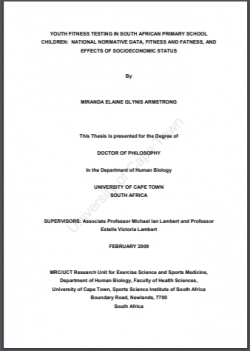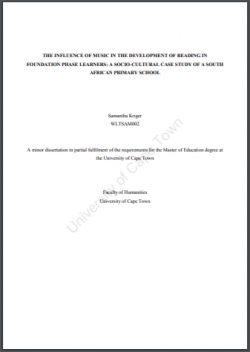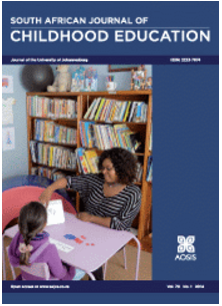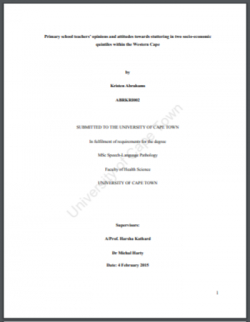Corporal punishment : cultural-historical and socio-cultural practices of teachers in a South African primary school
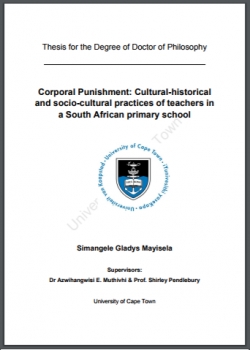
Type
Thesis
Authors
Category
ECCE, Foundation, Intermediate, Senior
[ Browse Items ]
Publication Year
2017
Publisher
University of Cape Town, School of Education, Cape Town, South Africa
URL
[ private ]
Pages
350 p.
Subject
Early childhood education, Primary education, Teachers, Learners, Parents, Corporal punishment, Psychological functions, Cultural-historical processes, Socio-cultural processes, Transformation, South Africa
Tags
Abstract
In this study, corporal punishment refers to the administration of physical pain to children by teachers with the purpose of disciplining them. It is a phenomenon that occurs in South African primary schooling despite its legal abolition two decades ago. Anecdotal evidence suggests that teachers, particularly those who have been culturally exposed to corporal punishment and other forms of violence, believe that corporal punishment is still an effective mode of disciplining children. Drawing on Vygotsky's cultural-historical activity theory (CHAT), this study seeks to investigate how the notion of historical and cultural genesis of higher psychological functions can explain the continuing use of corporal punishment in schools. A qualitative methodology, employing observations and interviews as data collection methods in a case of a rural public school in Mpumalanga was adopted, where teachers, parents and children were participants in the study. Data were analysed thematically within the CHAT framework to address the main research question: What cultural-historical and socio-cultural processes account for the teachers' continuing use of corporal punishment in a South African rural primary school? Findings suggest that corporal punishment manifests as a socially mediated tool used within an object-oriented cultural activity and a historically-bound activity systems. Through the analysis of the contradictions embedded within and between the activity system(s), possibilities for transformation were revealed. The intra-psychological processes and nuances of the internalisation of corporal punishment by individuals and the collective show that corporal punishment is likely to compromise the development some higher psychological functions related to discipline like problem-solving, self-regulation, sequencing and agency.
Description
Thesis (PhD)--University of Cape Town, 2017
Number of Copies
1
| Library | Accession No | Call No | Copy No | Edition | Location | Availability |
|---|---|---|---|---|---|---|
| Main | 775 | 1 | Yes |
